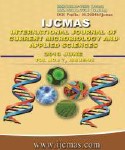


 National Academy of Agricultural Sciences (NAAS)
National Academy of Agricultural Sciences (NAAS)

|
PRINT ISSN : 2319-7692
Online ISSN : 2319-7706 Issues : 12 per year Publisher : Excellent Publishers Email : editorijcmas@gmail.com / submit@ijcmas.com Editor-in-chief: Dr.M.Prakash Index Copernicus ICV 2018: 95.39 NAAS RATING 2020: 5.38 |
Despite the fact that rising global population requires increased crop production, the rate of increase in crop yields is currently declining. The traits related to yield, stability and sustainability should be a major focus of plant breeding efforts. These traits include durable disease resistance, abiotic stress tolerance along with nutrient and water use efficiency. The use of DNA markers in plant breeding is called marker assisted selection (MAS). So far, about 101 major blast genes have been identified, many of them have been mapped cloned on different rice chromosomes, and tightly linked DNA markers have been developed. So, blast resistance genes can be combined using MAS in a single genetic background to develop rice cultivars with broad-spectrum durable resistance to blast. In this research work, we have introgressed two genes Pi1 and Pi2 in local variety of Chhattisgarh dubraj. Dubraj is extremely popular aromatic short medium grain variety in Chhattisgarh and Madhya Pradesh region. PR-122 is used as donor for resistant gene to introgress blast genes Pi-1 & Pi-2. The cross was attempted and progenies were obtained in Kharif 2016 season. Out of 29 plants 9 plants were selected for further screening. Progenies were screened phenotypically as well as genotypically for blast resistance for three consecutive seasons (Kharif 2016, Summer 2017 & Kharif 2017). During kharif 2017, 9 plants showing blast resistance both phenotypically as well as genotypically were sown in summer 2018. Forty seven plants with positive correlation between phenotype and genotype for blast resistance as observed in Summer 2017, were taken up for further generation advancement and screening during Kharif- 2018. Combination of conventional and marker assisted selection approach will provide opportunities for breeders to develop high yielding, stress tolerant and better quality rice variety.
 |
 |
 |
 |
 |